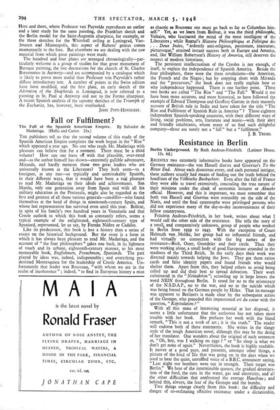Fall or Fulfilment ?
THE publishers tell us that the second volume of this study of the Spanish American Empire completes the work begun in the "Rise" which appeared a year ago. No one who reads Mr. Madariaga with pleasure can believe that for a moment. There must be a third volume! How can one leave off with that plausible, over-rated and—as the author himself has shown—extremely gullible adventurer, Miranda, and hardly mention those two great leaders who are universally known as the Liberators? They both seem—to a foreigner, at any rate—so typically and unmistakably Spanish, in their different ways, that it would have been a real pleasure to read Mr. Madariaga on their ideals and achievements. San Martin, only one generation away from Spain and with all his military education in the Peninsula, might also be regarded as the first and greatest of all those various generals—caudillos—who found themselves at the head of things in nineteenth-century Spain, and whose last representative has survived even until this year. Bolivar, in spite of his family's two hundred years in Venezuela and that Creole outlook to which this book so constantly refers, seems a typical example of the enlightened, eighteenth-century type of Spaniard, represented, let us say, by Femin Ntifiez or Cadalso.
Like its predecessor, this book is less a history than a series of essays on the historical background. But the essay is a form in which it has always been pleasant to read Mr. Madariaga, and the account of " the four philosophers " takes one back, in its lightness of touch and its urbane, eighteenth-century manner, to his most memorable book, Englishmen, Frenchmen, Spaniards. The part played by ideas was, indeed, indispensable ; and everything pre- destined Montesquieu for the leadership of Creole America. Un- fortunately that leader was Rousseau, "with whom we are in the realm of incoherence " ; indeed, " to find in European history a man as chaotic as Rousseau one must go back as far as Columbus him- self." Yet, as we learn from Bolivar, it was the third philosophe, Voltaire, who fascinated the mind of the most intelligent of the Liberators ; while Rayinal's Histoire Philosophique et ,Politique des . . . Deux Indes, "ardently anti-religious, passionate, inaccurate, picturesque," attained instant success both in Europe and America, and, like William Robertson's History of America, still deserves the respect of modern historians.
The persistent intellectualism of the Creoles is not enough, of itself, to explain the independence of Spanish America. Beside the four philsophers, there were the three revolutions—the American, the French and the Negro ; but by stopping short with Miranda and the " precursors," the book does not really explain how or why independence happened. There is one further point. These two books are called " The Rise " and "The Fall." Would it not have been more accurate, and more historical, to have followed the example of Edward Thompson and Geoffrey Garratt in their masterly account of British rule in India and have taken for the title " The Rise and Fulfilment of Spanish Rule in America" ? Those eighteen independent Spanish-speaking countries, with their different ways of living, social problems, arts, literature and music—with their alert
and friendly inhabitants, whom many of us find such delightful company—those are surely not a " fall" but a "fulfilment."
"J. B. TREND.






























 Previous page
Previous page